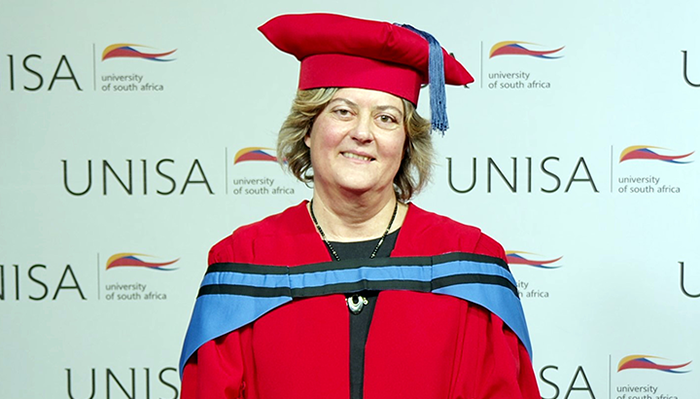
The largest provider of business education in Africa and one of the largest in the world

Prof Katherine Malan
Prof Katherine Malan from the Department of Decision Sciences in the College of Economic and Management Sciences at Unisa recently delivered her inaugural lecture titled "Developing Human Understanding of AI Algorithms". The thought-provoking presentation highlighted the urgent need for artificial intelligence (AI) systems to be developed with reliability and transparency in mind, especially in sectors where decisions can have far-reaching consequences.
In her lecture, Malan explained that while artificial intelligence holds tremendous potential to positively impact various sectors of the South African economy and society, many AI systems are currently designed in ways that make them unreliable. "Nobody properly understands how AI systems work, not even the AI experts, and so it is impossible to predict how they will behave in new situations," she said.
Her research focuses on unpacking the inner workings of AI algorithms to build trust and reliability in their application. This includes analysing problem instances to understand what makes them difficult to solve, studying algorithm behaviour across different problem sets, and developing models that automate the selection of algorithms suited to specific contexts. Malan’s work is built on a strong network of international collaborators from South Africa, the United Kingdom, France, Australia, Spain, and Portugal, as well as partnerships with postgraduate students.
Dr Mantepu MaseTshaba, Acting Executive Dean of the College of Economic and Management Sciences, commended Malan’s contribution to advancing knowledge in AI. She noted that Malan’s work reflects the kind of forward-thinking scholarship that is essential for shaping the future of technology in South Africa. "Her research," said MaseTshaba, "bridges the gap between human understanding and complex AI systems, paving the way for responsible innovation, and sets a powerful example for both academics and students."
Reflecting on her promotion to full professorship, Malan shared her gratitude and humility. "I am very grateful to have reached this milestone in my career, but I am also very aware that it was not a solo journey," she commented. "I have been blessed through collaborations with inspiring researchers from across the world and with opportunities to supervise and co-supervise many talented postgraduate students. It is this rich network of partnerships backed by support from the Department of Decision Sciences that made it possible to reach full professorship."
In offering advice to young researchers, she encourages a focus on depth and meaningful impact rather than volume. "Quality is more important than quantity," she said. "There is extreme pressure to produce large numbers of research outputs, but my advice is rather to produce fewer outputs that you are proud of, than many outputs that lack depth. Focus on building your research networks: travel to international conferences, meet people who share your research interests, and initiate collaborations. Be active as a peer reviewer for journals and conferences, it will help you to keep up to date with developments in the field and broaden your perspective on your own research."
Malan has been listed in the top 2% of scientists worldwide by the Stanford University/Elsevier rankings (2023–2025) in the field of Artificial Intelligence and Image Processing. She holds an NRF B3 rating for research (2025-2030). She has received several institutional accolades, including the Unisa College of Economic and Management Sciences Excellence Award for Teaching and Learning in 2023 and the Tuition Award for Excellent Module Design in 2018.
* By Tebogo Mahlaela, Communication and Marketing Specialist, College of Economic and Management Sciences
Publish date: 2025-10-29 00:00:00.0